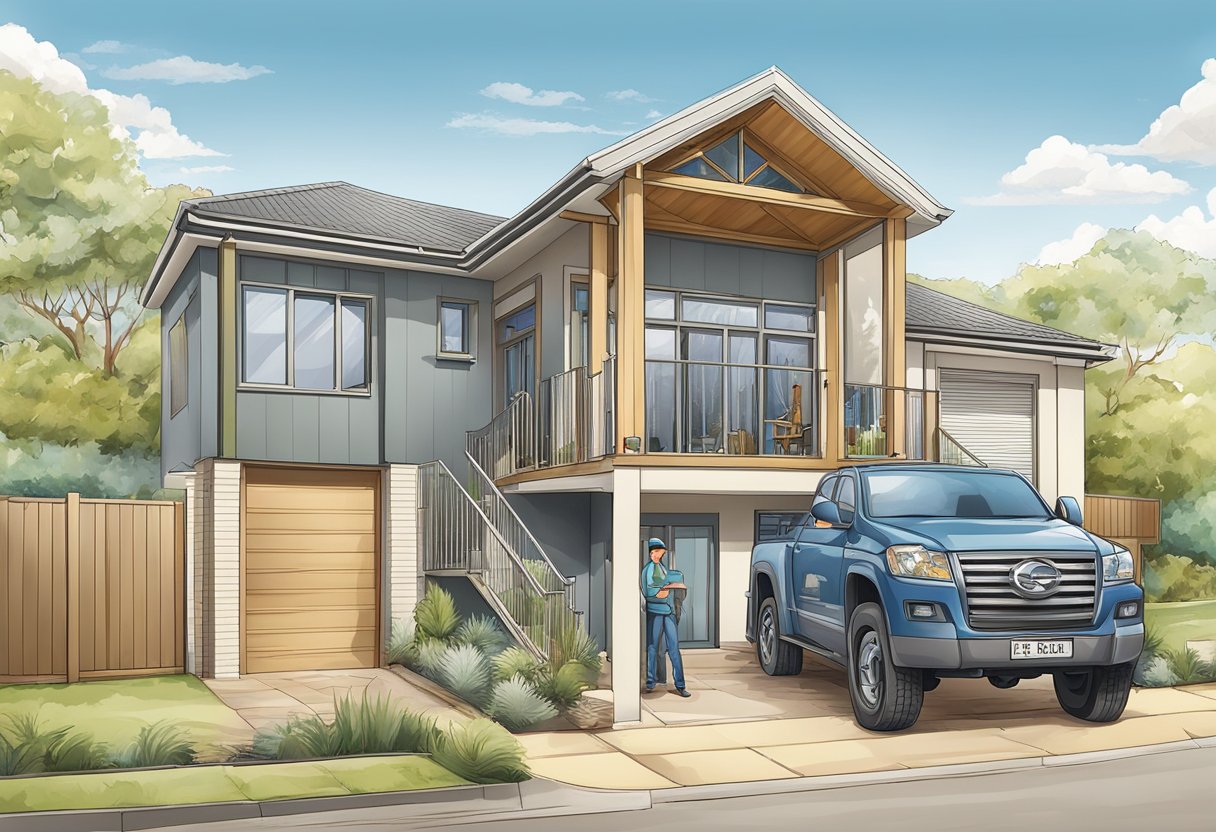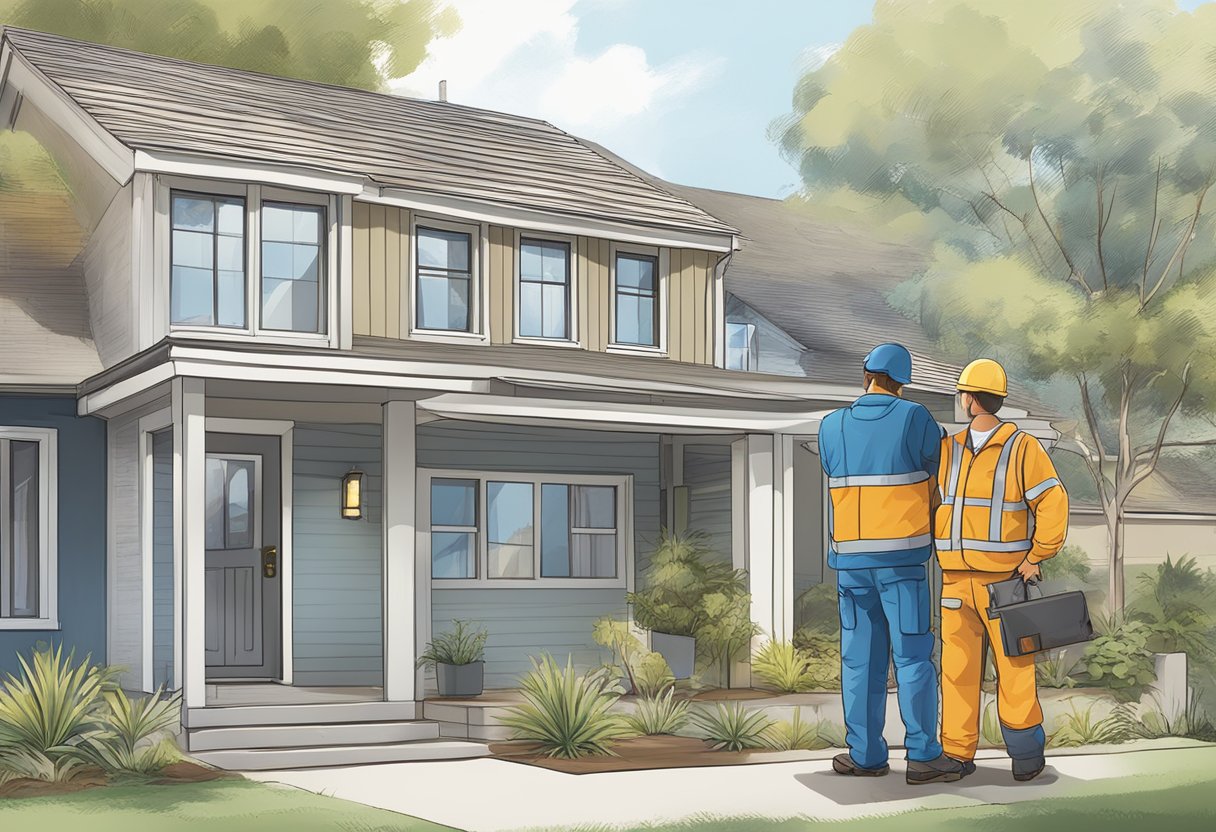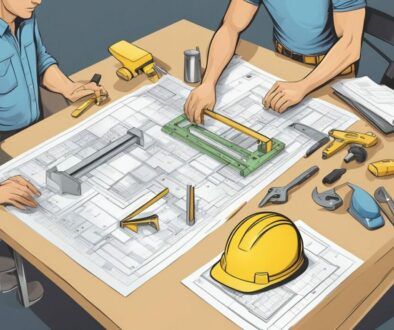How to Choose a Home Builder in Australia: Essential Tips for a Successful Project

Table of Contents
- 1 Understanding the Role of the Home Builder
- 2 Licenses and Accreditation
- 3 Experience and Expertise
- 4 Reputation and Reviews
- 5 Cost Estimation
- 6 Communication and Customer Service
- 7 Warranty and After-Sales Service
- 8 Frequently Asked Questions
- 8.1 What factors should I consider when selecting an Australian home builder?
- 8.2 How can I ensure a builder has a solid reputation?
- 8.3 What questions should I ask potential builders?
- 8.4 Which certifications and licences should an Australian builder have?
- 8.5 How can I compare and contrast quotes from different builders?
- 8.6 What warning signs should I watch for when choosing a builder?
Deciding to build a new home in Australia can be an exciting yet daunting process. With numerous construction companies and home builders to choose from, it’s essential to make the right decision from the outset. This article will provide a helpful guide for prospective homeowners, outlining key factors to consider when selecting the ideal home builder for their project.
Location and experience are two vital components when it comes to finding a reliable and skilled home builder. Examining the builder’s geographical knowledge and understanding of local regulations is instrumental in ensuring a successful construction. Furthermore, a builder with a strong track record of completed projects within the area will instil confidence in their ability to deliver the desired outcome.
Another important aspect is the builder’s communication and management style. Transparent and open communication channels are essential for a smooth construction process, as well as establishing a strong working relationship. Additionally, understanding the builder’s approach to project management, including timelines, material sourcing, and subcontractor collaboration, will help potential homeowners make a more informed decision.
Understanding the Role of the Home Builder

The home builder plays a crucial role in the construction of a new home in Australia. Their primary responsibility is to manage the overall project, from design to completion, ensuring that the home is built to the client’s specifications, local building codes, and industry standards.
To begin with, the home builder collaborates with architects and designers to create a blueprint of the home. This includes considering the layout, aesthetics, and functionality of the space. Alongside the design aspect, the home builder is responsible for acquiring necessary permits and ensuring that the construction adheres to local regulations.
Once the planning stage is complete, the home builder oversees the actual construction process. This involves coordinating with various tradespeople such as carpenters, electricians, and plumbers. The home builder must also manage the procurement of construction materials and ensure their timely delivery to the worksite.
Throughout the construction process, maintaining a clear line of communication with the client is vital. The home builder keeps the client informed of the progress, addressing any concerns or changes that may arise. This is particularly important as unforeseen issues may occasionally impact the project’s timeframe or budget.
Lastly, the home builder is responsible for quality control and ensuring that the final result meets the client’s expectations. They carry out inspections at every stage of construction, addressing any issues or discrepancies as they arise. Once the home is complete, the builder hands over the keys to the client, marking the end of their role in the project.
Licenses and Accreditation
When choosing a home builder in Australia, it is essential to verify that they hold the necessary licenses and accreditation. In Australia, each state has its building and construction regulatory authorities that issue licenses to qualified builders.
For example, in New South Wales, builders must have a license from NSW Fair Trading. In Victoria, the Victorian Building Authority (VBA) regulates the industry, and in Queensland, the Queensland Building and Construction Commission (QBCC) manages licensing. To ensure your builder is legitimate, you can verify their licensing status on the respective authority’s website.
It’s also important to consider any affiliation with industry associations, which demonstrate a builder’s commitment to professionalism and adherence to industry standards. Examples of such associations include:
- Housing Industry Association (HIA): Australia’s largest residential building organisation, promoting industry standards and providing support to members.
- Master Builders Association (MBA): A membership-based organisation that works to ensure high standards in the construction industry and provides services to its members.
Look for a builder who has a solid track record and experience in the type of home you want to build. This may include checking online reviews, speaking to past clients, and visiting recently completed projects. Keep in mind that a reputable builder should also have appropriate insurance coverage, such as Home Indemnity Insurance and Public Liability Insurance, to protect you and your investment during the construction process.
By thoroughly researching a builder’s licenses, accreditation, and experience, you can be confident that you are selecting the best home builder for your project in Australia.
Experience and Expertise
Years in the Business
When selecting a home builder in Australia, it’s important to consider their experience within the industry. Generally, a builder who has been in business for a significant amount of time has a better understanding of the construction process and can effectively manage potential challenges. Look for a builder with at least 5 years of industry experience to ensure they have the necessary skills and knowledge.
Past Projects
It’s essential to assess a builder’s past projects to understand their capabilities and the quality of their work. When researching home builders, be sure to:
- Request a portfolio of their completed projects
- Contact previous clients for references and feedback
- Visit recently completed projects to inspect the quality of craftsmanship
By evaluating past projects, you’ll gain valuable insights into a builder’s expertise and suitability for your project.
Custom vs. Spec Builders
There are two types of home builders in Australia – custom and spec builders. To make an informed decision, it’s important to understand their differences:
Custom Builders
- Tailor a home design to suit your needs
- Offer flexibility in customisation
- Tend to be more costly due to personalised services
Spec Builders
- Build homes based on pre-existing designs
- Limited to a set range of plans and designs
- More affordable but with fewer options for personalisation
Choosing the right builder primarily depends on your budget and the level of customisation you desire for your new home.
Reputation and Reviews
Reputation is a key factor to consider when choosing a home builder in Australia. A builder with a solid reputation demonstrates a history of delivering quality work and satisfying customer needs. To gauge a builder’s reputation, consult industry bodies like the Housing Industry Association (HIA) and Master Builders Association (MBA). These organisations can provide an assessment of a builder’s standing within the industry.
Reviews can also prove invaluable in determining the quality and reliability of a home builder. Look for client testimonials and case studies on the builder’s website, as well as independent review platforms such as ProductReview.com.au and Google Reviews. Pay attention to factors like:
- Quality of materials and workmanship
- Timeliness of project completion
- Communication and customer service
- Ability to meet budget expectations
When examining reviews, consistency is essential. A builder who consistently receives positive feedback is more likely to meet your expectations than one with a mix of positive and negative reviews. Don’t be afraid to ask around within your social network, as personal recommendations from friends or family can also provide valuable insights.
In summary, researching a builder’s reputation and reviews is a critical step in finding the right partner for your home construction project in Australia. Consider these factors to help ensure you’re making an informed decision that will lead to a positive outcome for your dream home.
Cost Estimation
When choosing a home builder in Australia, it’s important to consider the cost estimation process. This section will discuss transparent pricing and budget considerations to help you navigate this aspect of the home building experience.
Transparent Pricing
To ensure you’re working with a reputable home builder, seek transparent pricing. Quality home builders provide detailed cost estimates that outline labour, materials, and other expenses. Review these estimates to understand potential extra costs, such as site preparation, landscaping, or council fees.
When comparing builders, consider that the lowest quote may not always be the best option. Look for realistic, itemised quotes that help you understand the value for money offered by each builder.
Budget Considerations
When planning a new home build, it’s crucial to establish your budget early in the process. This will help guide your decisions on design, materials, and the choice of builder. To keep your budget in check, consider the following:
- Prioritise needs over wants. Make a list of essential features for your new home, while also including any non-essential but desired elements. Be prepared to compromise on some aspects to stay within budget.
- Factor in contingency funds. Unexpected expenses can arise during a build, from changes to the design to unforeseen site complications. Allocating a contingency budget (usually 5-10% of the total build cost) will help you prepare for these potential issues.
- Track and monitor expenses. Regularly check your expenditure against your budget, and make adjustments as needed. This will help ensure that you remain in control of your finances throughout the build.
In summary, obtaining accurate cost estimates and carefully considering your budget are essential steps in choosing the right home builder in Australia. This attentiveness will help you make well-informed decisions and ultimately achieve your dream home.
Communication and Customer Service
When choosing a home builder in Australia, it’s essential to consider the builder’s communication and customer service skills. A builder with excellent communication will keep you informed throughout the construction process, ensuring there are no surprises. In this section, we will discuss some key aspects to look for in a builder’s communication and customer service skills.
To start with, it’s crucial to find a builder who is responsive and timely in returning calls and emails. This can help you avoid frustration and misunderstandings. It’s also essential to check how the builder communicates with their subcontractors, as this could have a direct impact on the quality of work.
Next, consider the builder’s customer service approach. Do they treat each customer with respect, listen to their needs and preferences, and show a genuine interest in fulfilling their expectations? Ask for references and speak to past clients to get a feel of their experiences when working with the builder.
Another important factor is the builder’s ability to clearly explain the building process and any potential issues that may arise. This knowledge can help you understand the project’s complexities and make informed decisions. Builders should also have a structured process for addressing questions and resolving any concerns.
Finally, look for transparency when it comes to pricing and contract terms. A reliable builder should be able to provide you with an itemised quote, allowing you to see a detailed breakdown of costs and materials.
In summary, prioritising communication and customer service when selecting a home builder in Australia will ensure a smoother building process and a more enjoyable experience.
Warranty and After-Sales Service
Choosing a home builder in Australia involves considering the warranty and after-sales service they offer. A quality builder’s warranty demonstrates their confidence in their craftsmanship, while a strong after-sales service ensures customer satisfaction long after the construction has been completed.
When comparing builders, pay attention to structural warranty periods. In Australia, a warranty of 6-7 years is the minimum requirement, but some builders may extend this up to 10 years or more. Be sure to read the fine print on what the warranty covers, such as structural defects and materials used.
After-sales service can make a significant difference in your overall experience with a builder. Take the time to research what services each builder provides after construction. Some points to consider include:
- Responsiveness to maintenance requests: Check online reviews and testimonials to gauge the builder’s responsiveness in addressing issues that may arise after the home is built.
- Maintenance periods: Some builders may offer a maintenance period of around 3-6 months where any minor defects can be fixed free of charge.
- Communication: A good builder will maintain open and transparent communication throughout the entire process, ensuring that any concerns or questions are promptly addressed.
Taking the time to thoroughly examine the warranty and after-sales service offerings of different home builders in Australia will help guarantee a satisfactory outcome. As a home buyer, it’s crucial to be well-informed and choose a builder who not only creates a quality home but also stands by their work and prioritises customer care.
Frequently Asked Questions
What factors should I consider when selecting an Australian home builder?
When selecting a home builder, consider factors such as experience, reputation, quality of work, budget constraints, and communication style. Research local builders and choose one who is well-versed in the type of project you’re undertaking, whether it be a custom build or a development.
How can I ensure a builder has a solid reputation?
To ensure a builder has a solid reputation, ask for client testimonials or references, and check online review platforms. Consult family and friends for recommendations and consult industry associations such as Master Builders Australia or the Housing Industry Association to verify their membership.
What questions should I ask potential builders?
When meeting with potential builders, it’s essential to ask about their experience, qualifications, licences, and insurance coverage. Inquire about projected timelines, costs, materials, and their approach to communication. Ask if they offer a warranty on their work and clarify what issues it covers.
Which certifications and licences should an Australian builder have?
An Australian builder should hold a valid builder’s licence or registration relevant to their state or territory. They should also have appropriate insurance coverage, including public liability and home warranty insurance. Builders might also be members of industry associations such as Master Builders Australia or the Housing Industry Association.
How can I compare and contrast quotes from different builders?
When comparing quotes from builders, consider the entire scope of work, including materials, labour, and any additional costs such as permits or site preparation. Ensure all builders provide a detailed breakdown of the project and evaluate their proposed timelines. Compare the quotes based on overall value for money and the builder’s professionalism.
What warning signs should I watch for when choosing a builder?
Warning signs to watch for when choosing a builder include poor communication, an unwillingness to provide references, quotes that are substantially lower or higher than the industry benchmark, and a lack of proper licences and insurance. Additionally, avoid builders who demand a large upfront deposit or pressure you to make hasty decisions.




